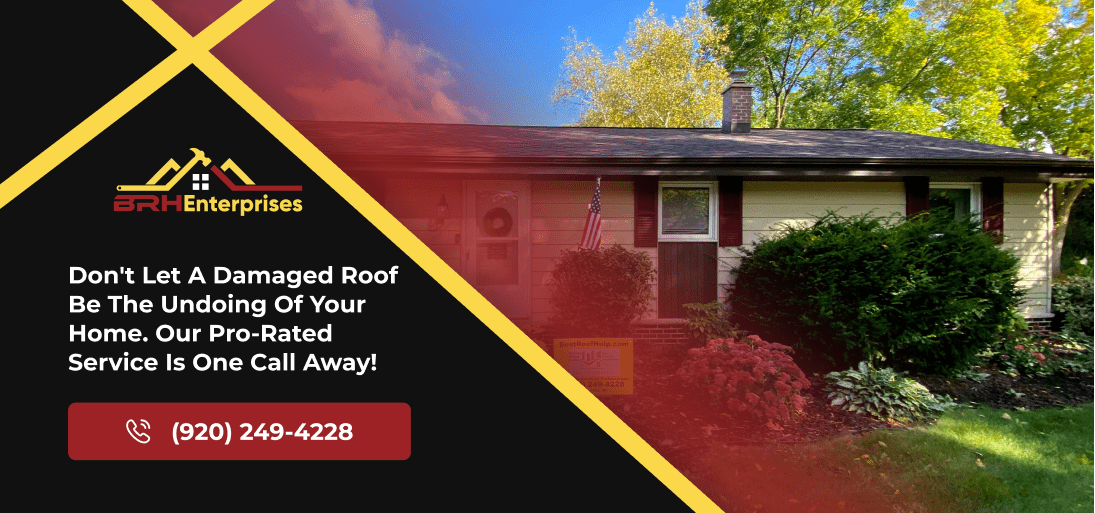What Is Roof Underlayment & The Different Types
Estimated Reading Time : 7 Min.

When it comes to roofing, homeowners mainly concentrate on the materials visible from the outside, like tiles or shingles. The roof underlayment, however, is an important part that is hidden, and therefore, frequently overlooked. But this is a crucial layer that shields your house from all types of weather.
To help you make the best choice for your roofing needs, we will examine the various types of roof underlayment that are on the market, provide product examples for each, and more! Keep reading to find the right underlayment.
What Is Roof Underlayment?
Roof underlayment is a crucial component of modern roof construction. It serves as a protective layer between the roofing material and the insulation material. This essential barrier, installed directly onto the wooden planks of the roof deck, safeguards the roofing structure from various weather conditions.
Acting as a shield between the roof deck and shingles, the underlayment prevents water damage and enhances the longevity of the roof. Designed to be waterproof, the underlayment effectively drains water away from the roof gutter.
It also ensures that the roofing system is airtight to limit energy loss and protect against wind damage. They tend to be vapor-permeable, allowing moisture to escape which prevents dampness from occurring on the interior of the roof, protecting the insulation material.
The 4 Best Types Of Roof Underlayment For Wisconsin Homeowners
Various types of roof underlayment are available, each with unique characteristics suitable for different roofing applications.
#1. Felt Underlayment
Felt underlayment, also known as felt paper, tar paper, or asphalt-saturated felt, is a common type of underlayment used for roofing systems, especially in the past. It serves as a water-resistant barrier between the roof deck and shingles, typically made from organic materials like cellulose and waterproofing agents such as asphalt or bitumen. It provides reliable protection against water damage and leaks.
Its primary role is to prevent water from penetrating the roof deck, which is particularly crucial in areas with heavy rainfall or snowmelt. Felt underlayment creates a continuous layer shielding the roof deck from leaks for various roofing materials, such as asphalt shingles, wood shakes, and metal roofing panels.
It’s also relatively inexpensive compared to other options, making it a popular choice for homeowners and contractors seeking cost-effective yet efficient roofing solutions.
Why Homeowners Prefer Felt Underlayment For Roofing
- Cost-Effective: Generally cheaper than synthetic options, easily found, and easy to install with common tools
- Waterproofing: Felt underlayment blocks water, safeguarding roofs from leaks and water damage
- Cushioning and Leveling: Provides impact resistance against hailstones and debris, enhancing the roof deck’s durability
- Better Breathability: Some types of felt underlayment improve ventilation, regulating attic temperatures and moisture
- Simple Fastening: This underlayment can be secured with staples or caps, enhancing wind resistance and leak protection
- Different Types: Comes in two primary types: #15 and #30. The latter, being thicker, provides higher resistance to installation damage
Product
Gorilla Guard® 30 Engineered Felt Underlayment

The Gorilla Guard 30 Engineered Felt Underlayment by Atlas, a part of the durable Gorilla Guard series, offers strong protection against water and wind-driven rain. This high-quality underlayment is made for consistency and versatility, suitable for various roofing projects. It’s 36% lighter and 28% stronger than traditional organic #30 felt underlayment, with a four-square roll for easier handling. Plus, it lays flatter and has superior water-shedding characteristics.
#2. Synthetic Underlayment
Modern roofing materials like synthetic roof underlayment are made by binding polypropylene or polyethylene into a polymer to create a barrier of protection between the roofing material and the roof deck. As an improved substitute for conventional felt underlayment, this ground-breaking product has become well-known in the metal roofing industry.
Synthetic underlayments have many advantages, including being lightweight, having warranties, having walkable surfaces that are non-slip, being recyclable, having Class-A fire resistance, and not getting wrinkled. But with these benefits, synthetic underlayment is more expensive than felt underlayment.
Yet, synthetic roof underlayment is still the best option for roofing projects that need to last a long time and require premium dependability. This is because it offers superior performance, durability, and safety features.
Why Homeowners Prefer Synthetic Underlayment For Roofing
- Lightweight: Synthetic underlayment weighs 2 to 4 pounds per roofing square, making handling and installation easier
- Warranty: Typically comes with warranties lasting up to 50 years based on industry standards
- Walkability: It offers slip-resistant surfaces for better traction during installation, especially in wet conditions
- Fire Resistance: Many synthetic underlayments have a Class-A fire rating, ensuring high resistance to combustion
- Wrinkle-Free: Synthetic underlayments remain flat and smooth, unaffected by moisture or sunlight exposure
- Longevity: Lasting 25 to 50 years, synthetic underlayments outlive felt underlayment by a significant margin
- Easier Installation: Tear and wrinkle-resistant, synthetic underlayments allow for smoother installation with larger rolls and a lighter weight
Product
IKO Stormtite® Synthetic Underlayment

Stormtite Synthetic Underlayment by IKO is a cost-effective, flexible barrier for use under asphalt shingles, offering a strong alternative to traditional organic felts. It remains pliable in cold weather and allows for easy installation due to its lightweight, flat-laying design. Coated with tough polyolefin on both sides, it resists weather and features a slip-resistant surface. This underlayment also sheds water effectively and acts as a vapor retarder, with UV stabilizers allowing up to 30 days of exposure.
#3. Peel And Stick Roof Underlayment
With its adhesive backing, peel and stick roof underlayment is a synthetic material that makes nail-free installation simple and secure. It minimizes water penetration and pooling by creating a tight seal and functioning as an excellent moisture barrier. It’s flexible and perfect for flat roofs, guaranteeing a tight fit and optimal protection.
Its sturdy polymer construction and 48-mill thickness make it resistant to tearing, cracking, and bad weather. Its non-skid top layer also increases safety on the job site, and its lightweight design makes handling easier.
Why Homeowners Prefer Peel And Stick Roof Underlayment For Roofing
- Moisture Barrier: Seamless, wrinkle-free installation minimizes water pooling and penetration
- Flexibility: Easy to install around ridges and valleys for a snug, protective fit
- Durability: 48-Mil thickness and polymer construction resist cracking, tearing, and harsh weather
- Worker Safety: Lightweight rolls reduce strain, with a non-skid top layer that improves traction
- Code Compliant: Meets building standards, protecting against water infiltration in storm-prone areas
Product
WeatherMaster® Ice & Water 200 Underlayment

Another roofing underlayment product by Atlas, the WeatherMaster® Ice & Water 200 Underlayment is a composite, self-adhesive roof underlayment designed to prevent ice dams and wind-blown rain damage. It provides continuous waterproofing by sealing to the roof deck and around nails. Suitable for all roofing applications, it can serve as a primary underlayment or act as flashing tape for extra protection against moisture entry.
#4. Rubberized Asphalt Underlayment
Rubberized asphalt underlayment is a roofing material that combines asphalt with rubber polymers, creating a highly effective waterproof barrier. This blend allows the underlayment to bend, stretch, and conform to the roof’s shape, accommodating any contours or irregularities.
Its self-adhesive nature eliminates the need for nails or staples too, ensuring a seamless and watertight seal. Ideal for areas with heavy rainfall or harsh weather, rubberized asphalt underlayment is both flexible and durable, maintaining its effectiveness in varying conditions. It can also be left exposed for 90 to 180 days without performance loss.
Why Homeowners Prefer Rubberized Asphalt Underlayment For Roofing
- Waterproofing: Rubberized asphalt underlayment provides excellent protection against water damage and leaks
- Self-Adhesive: Features an adhesive backing that activates on contact, eliminating the need for nails or staples
- Flexibility: Bends and stretches to conform to the shape of the roof, ensuring a snug fit.
- Longevity: Offers a long lifespan, with premium materials ensuring enhanced durability over time
- Heat Resistance: Withstands intense temperatures better than asphalt-saturated felt
- Cost: Higher cost justified by superior performance and durability
- Weight: Slightly heavier, requiring proper structural support
- Durability: Resists harsh weather and temperature fluctuations, maintaining effectiveness
Product
Henry® Eaveguard® Self-Adhered Shingle Underlayment

Providing a secondary defense against water infiltration and ensuring roof longevity, Henry® Eaveguard® protects vulnerable areas of steep-slope roofs such as eaves, rakes, and flashing around chimneys and skylights. The product self-seals around nails and fasteners, and has a surface that provides traction for workers. It also offers enhanced tear resistance and can be directly exposed to UV light for up to 60 days.
How Do You Know If Your Roof Underlayment Needs To Be Replaced?
1. Visible Damage
Visible damage like tears or punctures can compromise the underlayment’s ability to protect your roof. Water stains on ceilings or walls indicate the underlayment may not be functioning properly.
2. Leaks or Water Intrusion
Leaks inside your home may indicate underlayment failure, since it’s sometimes the last line of defense. Excess moisture in the attic or crawl space can also signal a compromised underlayment.
3. Roofing Material Issues
Loose or missing shingles expose the underlayment, speeding up its deterioration. Curling or buckling shingles often indicate issues with the underlayment too since it’s meant to prevent moisture or heat from causing the shingles to curl or buckle like it should.
4. Mold or Mildew Growth
Mold or mildew growth on the underlayment during an inspection signals moisture problems and requires immediate attention.
5. Increased Energy Bills
Higher energy bills can indicate underlayment issues. A compromised underlayment leads to poor insulation, causing your HVAC system to work harder.
6. An Aging Roof
If your roof is nearing the end of its lifespan, you should inspect the underlayment for wear. An aging roofing system often means the underlayment is also aging.
Is Roof Underlayment Required By Building Codes?
Yes, the Wisconsin building codes require roof underlayment. According to the codes, shingle underlayment must be either number 15 asphalt-impregnated felt paper or a similar type of material that has not been damaged or deteriorated. Any materials that meet ASTM D 1970 standards are also suitable to be used as roof underlayment based on the codes.
Install Quality Roof Underlayment Today
Choosing the right underlayment is essential for the longevity and performance of your roofing system. Investing in a high-quality underlayment can provide peace of mind, knowing that your home is well-protected.
At BRH Enterprises, we offer expert roofing services with a focus on quality and customer satisfaction. Whether you need installation, repairs, or maintenance, our experienced team will make sure that your home is protected and looks its best. Give us a call today at (920) 249-4228 to learn more about how we can help you.


